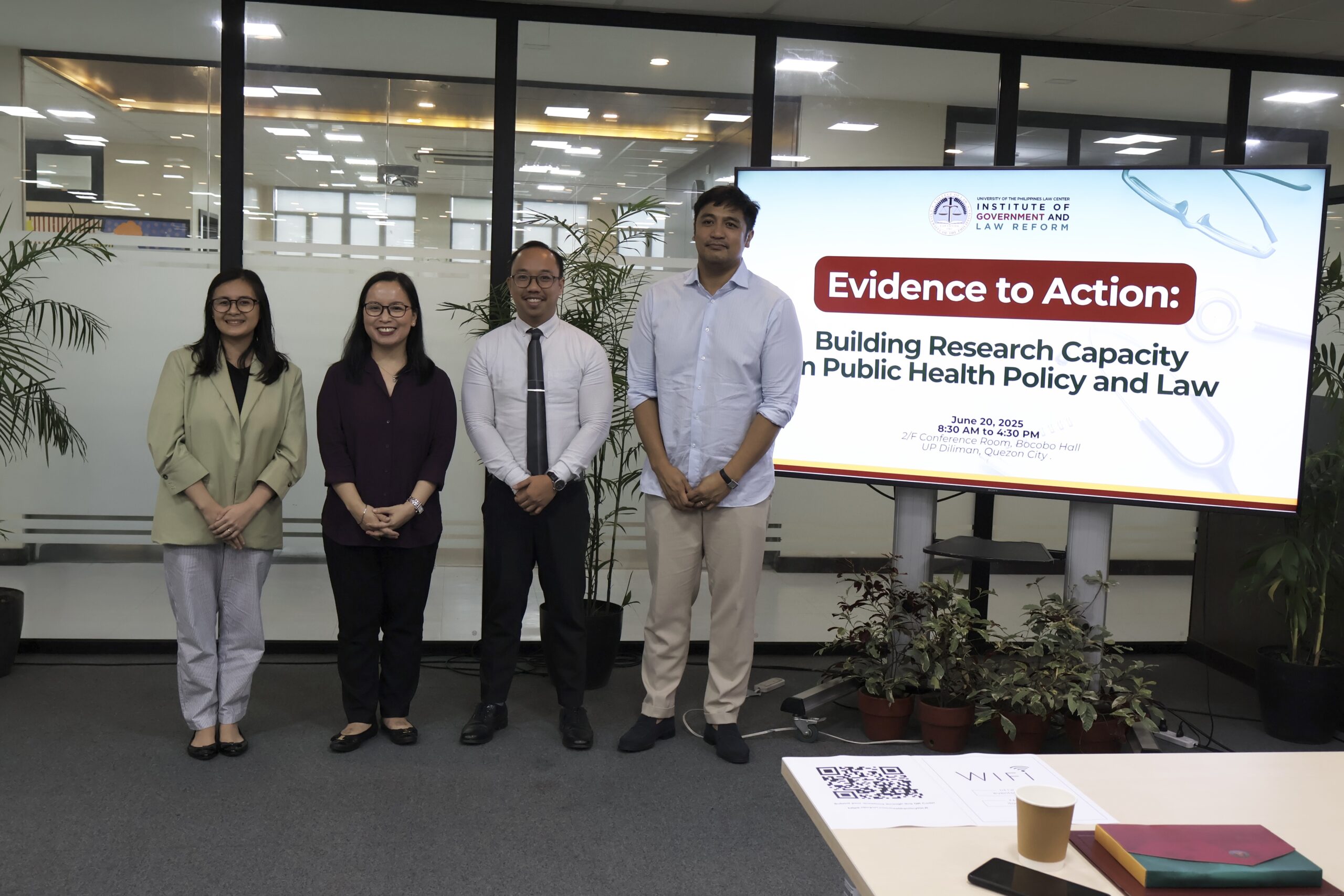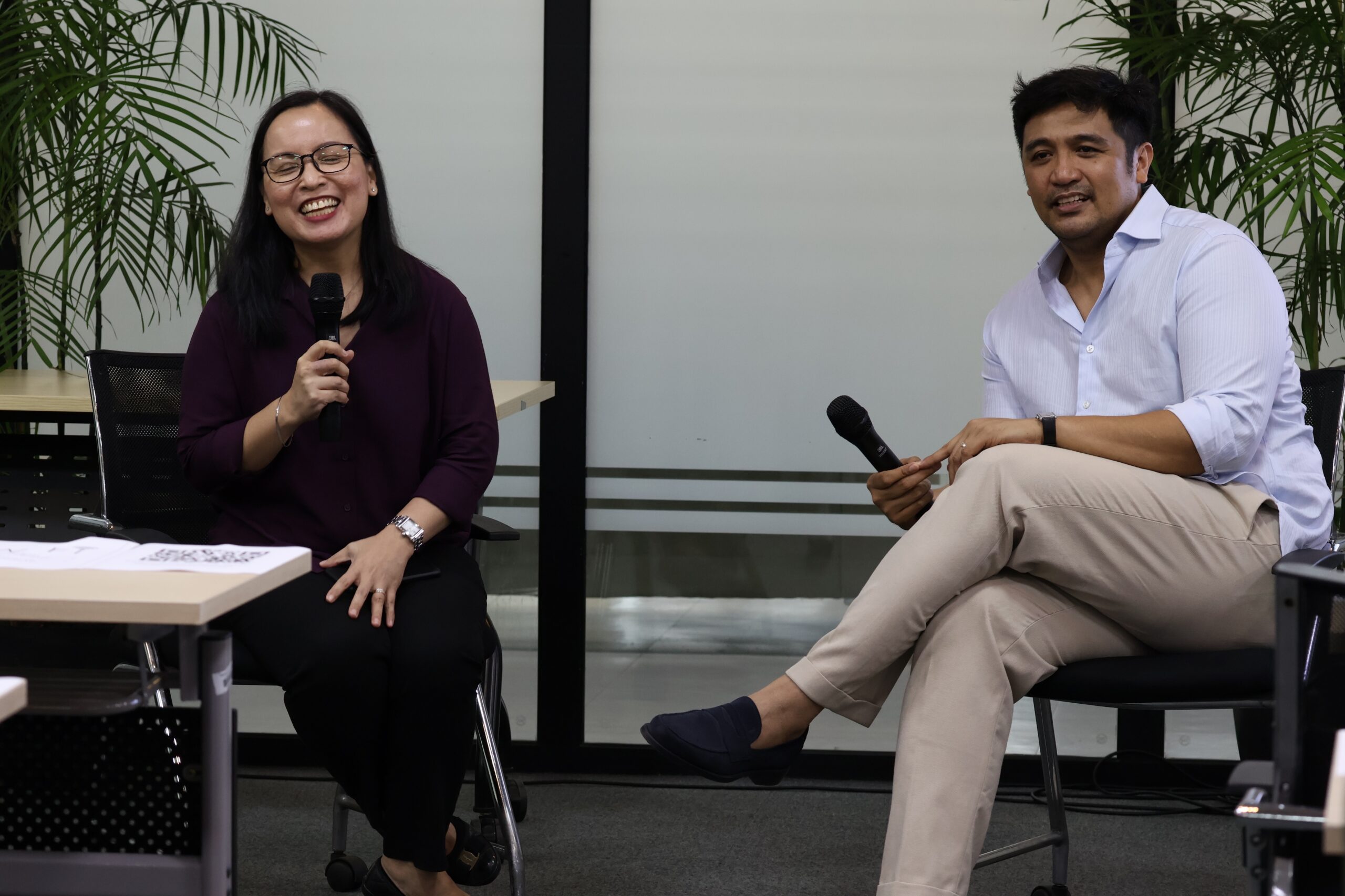On June 20, 2025, the University of the Philippines Institute of Government and Law Reform (UP IGLR) hosted a capacity-building seminar titled, “Evidence to Action: Building Research Capacity in Public Health Policy and Law.” This 1-day seminar was divided into 3 sessions exploring the following: 1) Policy Approaches to Prevention of Non-Communicable Diseases (NCDs) and Overview of Current Health Policies Focusing on NCDs; 2) Research Methods for Evaluating Health Policies and Data Collection Techniques; and 3) Monitoring & Evaluation in NCD Prevention and Control Policies.
Three experts in the field shared their insights on different topics during this one-day seminar. Prof. Lee Edson Yarcia, MD, JD, a Senior Lecturer of Medical Jurisprudence, Constitutional Law, Legal Theory, and Legal History at the UP College of Law and a Senior Legal Associate of the UP IGLR, led the first session. He emphasized the critical role of research and policy in combating the alarmingly increasing problem of NCDs. One of the biggest hindrances to solving this issue was the “merchants of doubt” who are groups or organizations that counter evidence and research and use doubt in the existing research to generate profit. Dr. Yarcia however explained that NCDs can be prevented and urged the government to implement legal and policy interventions. As food environments shape the problem of NCDs, policies promoting health-supportive environments, improving industry practices, and utilizing global frameworks like “WHO Best Buys” are some of the probable solutions to counter this phenomenon.
Dr. Katherine Ann Reyes, Research Assistant Professor at the Institute of Clinical Epidemiology and Program Lead of the Health Promotion Program at the National Institutes of Health spearheaded the second session. She highlighted that in starting the evaluation process, it is important to begin with establishing what you want to know. Dr. Reyes mentioned some of the common uses of evaluation, which included making judgments, guiding improvement, supporting design, or creating new knowledge. Dr. Reyes also discussed the different forms of evaluation, each with its distinct focus and purpose. Process evaluation looks into whether a policy or program is being implemented as intended and helps determine whether its delivery is aligned with its goals. Developmental evaluation is used when interventions are still being shaped or refined, allowing for real-time feedback and adaptive changes. Formative evaluation is conducted during program development to improve its design and performance. Summative evaluation, often conducted at the end of a program, assesses its overall effectiveness and outcomes. Lastly, impact evaluation seeks to determine whether observed changes can be attributed to the intervention, often through rigorous methods like randomized controlled trials or difference-in-differences analysis.
Dr. Reyes emphasized that choosing the appropriate form of evaluation depends on the questions being asked, the stage of the intervention, and available resources. Ultimately, she underscored that evaluations should not be seen merely as technical tools, but as crucial exercises that guide decision-making, enhance accountability, and help ensure that health policies achieve meaningful and sustainable change.
Lastly, Dr. Valerie Ulep emphasized the crucial role of monitoring and evaluation (M&E) in shaping and assessing health policies, particularly for non-communicable diseases (NCDs). Viewing policy through a health economist’s lens, he highlighted the importance of evidence-based decision-making across the policy cycle—from ex-ante modeling (predicting impact before implementation), to routine monitoring (tracking fidelity), and ex-post evaluation (measuring actual outcomes). He demonstrated how data presentation, whether through metrics, benchmarks, or personal narratives, can significantly influence policy uptake. Dr. Ulep also stressed that effective policy design must consider institutional roles, equity, and economic trade-offs, and that strong evidence should guide intervention choices. Ultimately, his discussion underscored that well-executed evaluation is not just a technical task but a vital tool for ensuring that policies are impactful, equitable, and responsive to public health challenges.
During the question and answer portion of the seminar, the engagement between the audience and the key speakers highlighted the complex interplay of cultural, structural, and political challenges in implementing and evaluating health policies in the Philippines. Experts emphasized the need for infrastructure that promotes healthy behavior, a stronger culture of evidence-based policymaking, and integrated health information systems that connect data across agencies and empower both policymakers and citizens. The answers of the experts also underscored the importance of clarifying policy goals, strengthening institutional capacity, and protecting evaluation processes from political and personal biases. Lastly, participants called for greater support for NGO participation in research, including access to funding and capacity-building, recognizing their potential as credible partners in health reform.
Finally, Atty. Maria Yolanda Javellana, Officer-in-Charge of UP IGLR, delivered the closing remarks of the seminar. She emphasized the crucial role of cross-sector collaboration in transforming research into impactful health policy. While acknowledging that not all questions can be answered in a day, Atty. Javellana highlighted the value of creating spaces for shared learning and evidence-driven dialogue, framing the event not as a conclusion, but as the beginning of stronger partnerships and more people-centered health outcomes.
Written by: Hannah Socorro D. Cruz and Neil Dexter Jake A. Sebastian




